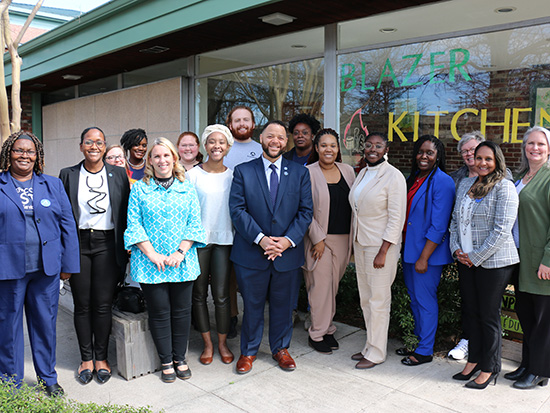 UAB has been awarded an American Rescue Plan grant to help serve food to insecure populations.The University of Alabama at Birmingham has received a grant for $60,000 from AmeriCorps, the federal agency for national service and volunteerism, as part of the VISTA program’s food security initiative. The grant, which is part of AmeriCorps’ historic $1 billion American Rescue Plan investment, allows UAB to expand its reach and provide food security resources and access across the Birmingham metro area and the surrounding region.
UAB has been awarded an American Rescue Plan grant to help serve food to insecure populations.The University of Alabama at Birmingham has received a grant for $60,000 from AmeriCorps, the federal agency for national service and volunteerism, as part of the VISTA program’s food security initiative. The grant, which is part of AmeriCorps’ historic $1 billion American Rescue Plan investment, allows UAB to expand its reach and provide food security resources and access across the Birmingham metro area and the surrounding region.
Launched in 2020, the food security initiative is a comprehensive and collaborative approach to ending hunger. AmeriCorps awarded more than $2 million in grants to eight organizations — including UAB — addressing the impact of hunger in multiple states in the time of COVID-19, with Alabama receiving funds to build the capacity of community-serving agencies in the Birmingham metro area and the Black Belt region.
“UAB has worked with AmeriCorps since 2014 to address social issues including food security, environmental sustainability, educational equity, refugee resettlement, workforce development, rural health and wellness, racial reconciliation, and opioid prevention and education,” said Amy Hutson Chatham, Ph.D., director for the UAB-AmeriCorps VISTA Statewide Program and assistant dean for Undergraduate Education in the UAB School of Public Health. “With this grant, we are looking forward to continuing to serve food-insecure populations in our footprint and provide equitable access to resources for those who need them.”
The grant enables UAB to collaborate with community partners, farmers, food banks and other community resources to identify funding opportunities, develop marketing materials and conduct outreach activities to promote food resources.
This VISTA initiative bolsters UAB’s ability to serve food-insecure populations by recruiting and managing volunteers and to support programs like Blazer Kitchen, UAB’s on-campus food pantry. Funded by employee contributions to UAB’s Benevolent Fund, Blazer Kitchen serves food-insecure students, employees and patients in nine UAB Medicine clinics and provides a space for people to collect fresh, frozen and non-perishable food items, as well as personal care items like toiletries — all at no cost.
“At the onset of the pandemic, hunger soared to the highest rates in modern history when schools were shuttered and older Americans’ meal programs put on hiatus,” said Michael D. Smith, AmeriCorps chief executive officer. “The work of our food-security initiative and the University of Alabama at Birmingham will turn back this tide and bring much-needed support to older adults and families.”